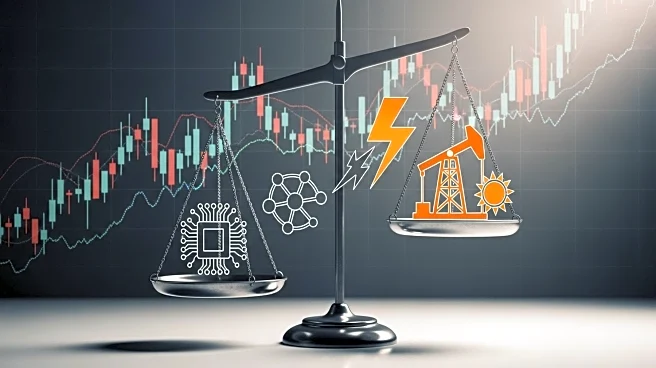What's Happening?
On September 24, 2025, major U.S. stock indexes experienced a decline for the second consecutive day. The tech-heavy Nasdaq fell by 0.4%, while the S&P 500 and Dow Jones Industrial Average each decreased by 0.3%. This downturn followed a three-session streak of record closing highs. The energy sector outperformed, driven by rising crude futures, while tech giants faced challenges. Freeport-McMoRan's shares dropped 17% due to lowered forecasts for copper and gold sales, and Axon Enterprise's stock fell 10% after announcing an acquisition. Conversely, Xcel Energy's shares rose 6.7% following a settlement related to the 2021 Marshall Fire in Colorado. Intel's stock surged 6.4% amid reports of potential investment from Apple and positive market outlooks.
Why It's Important?
The decline in major U.S. stock indexes highlights the volatility within the tech sector, which has been a significant driver of market growth. The energy sector's performance underscores the impact of rising crude prices on market dynamics. The mixed results among individual companies reflect broader economic uncertainties, including geopolitical tensions and fluctuating commodity prices. The Federal Reserve's comments on stock valuations add to concerns about potential market corrections. Investors are closely monitoring these developments, as they could influence future investment strategies and economic forecasts.
What's Next?
Market analysts are watching for potential shifts in investor sentiment, particularly regarding tech stocks, which have been trading at high valuations. The Federal Reserve's stance on interest rates and economic stability will be crucial in shaping market expectations. Companies like Intel may continue to benefit from strategic investments and partnerships, while others may face challenges due to external factors such as geopolitical risks and commodity price fluctuations. The energy sector's performance may remain strong if crude prices continue to rise.
Beyond the Headlines
The broader implications of these market movements include potential shifts in investment strategies, with investors possibly seeking safer assets amid tech sector volatility. The energy sector's gains may lead to increased focus on sustainable energy investments. Additionally, the Federal Reserve's comments on stock valuations could prompt discussions on regulatory measures to ensure market stability. The ongoing geopolitical tensions and commodity price fluctuations may also influence global economic policies.









